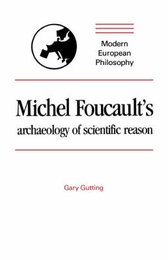
|
Michel Foucault's Archaeology of Scientific Reason: Science and the History of Reason
Hardback
Main Details
| Title |
Michel Foucault's Archaeology of Scientific Reason: Science and the History of Reason
|
| Authors and Contributors |
By (author) Gary Gutting
|
| Series | Modern European Philosophy |
|---|
| Physical Properties |
| Format:Hardback | | Pages:324 | | Dimensions(mm): Height 216,Width 138 |
|
| Category/Genre | Western philosophy from c 1900 to now |
|---|
| ISBN/Barcode |
9780521366199
|
| Classifications | Dewey:194 |
|---|
| Audience | | Tertiary Education (US: College) | | Professional & Vocational | |
|---|
|
Publishing Details |
| Publisher |
Cambridge University Press
|
| Imprint |
Cambridge University Press
|
| Publication Date |
29 September 1989 |
| Publication Country |
United Kingdom
|
Description
This is an important introduction to and critical interpretation of the work of the major French thinker, Michel Foucault. Through comprehensive and detailed analyses of such important texts as The History of Madness in the Age of Reason, The Birth of the Clinic, The Order of Things, and The Archaeology of Knowledge, the author provides a lucid exposition of Foucault's "archaeological" approach to the history of thought, a method for uncovering the "unconscious" structures that set boundaries on the thinking of a given epoch. The book casts Foucault in a new light, relating his work to Gaston Bachelard's philosophy of science and Georges Canguilhem's history of science. This perspective yields a new and valuable understanding of Foucault as a historian and philosopher of science, balancing and complementing the more common view of him as primarily a social critic and theorist.
Reviews"Gutting knows [Foucault's works] well. He summarizes them with clarity and precision and makes some valuable criticisms. The book is also exceptional in its treatment of the cultural context of the earlier Foucault." David Revill, The Times Literary Supplement "...Gary Gutting is the most likely to bring to historians of science a Foucault they will find comprehensible, if not uniformly congenial." Isis
|